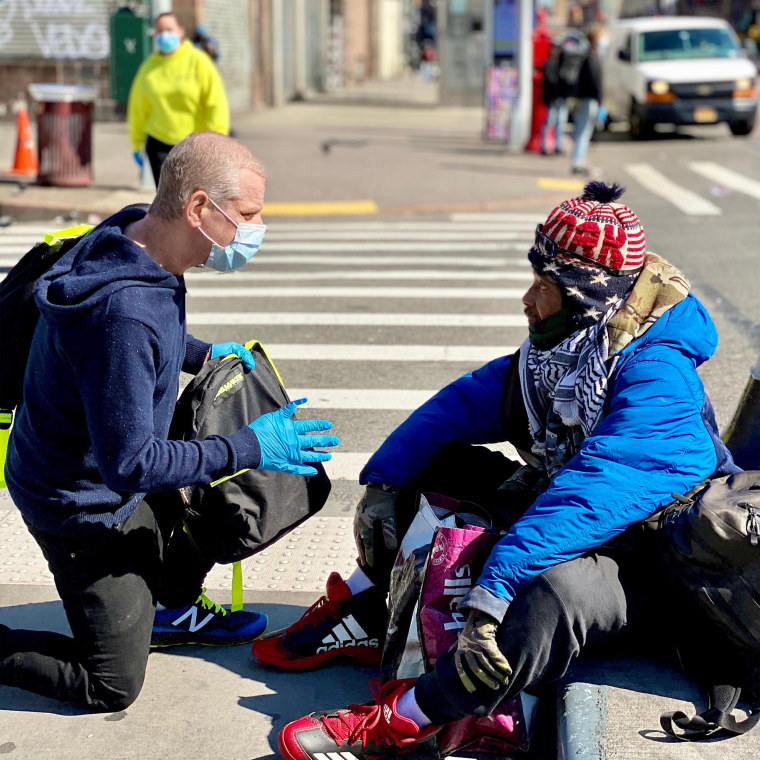Advocate for the homeless fights vaccine misinformation on the streets
On an overcast day in late August, a line of homeless people gathered eagerly outside Sara D. Roosevelt Park in New York City’s Lower East Side.
Four volunteers were rapidly pulling backpacks out of a U-Haul and handing them to those in line. In just 45 minutes, the volunteers from Backpacks for the Street, a mobile nonprofit group that provides vital supplies to those without homes, handed off 165 backpacks — a new daily record.
“I think the need is growing more and more,” said Jeffrey Newman, 53, who, along with his husband, Jayson Conner, 44, started the volunteer group in 2018. “People are getting kicked out of the hotel shelters,” he added, referring to an emergency hotel shelter program that ended over the summer.
Newman, a retired businessman, said he runs Backpacks for the Street around the clock, while Conner, who works at a local restaurant, joins him on his days off. The couple decided to start the group after volunteering at a soup kitchen for several years.
Since then, the group has grown to at least 80 volunteers and has given out 32,000 backpacks stuffed with 50 items, including hand sanitizer, masks, toiletries and socks. The backpacks also contain a slip of paper with instructions on how to get vaccinated and a card with Newman’s personal cellphone number, so clients can reach him directly for help. The group also connects people with free programs available to the homeless.

“If we get out there and we show the people how to get to these organizations, these programs, show them what is out there, that is part of the solution to get them off the street,” Newman said.
Demand for help is surging, according to him. Since Covid-19 arrived in the city in March 2020, the group has given out 25,000 backpacks. But while the homeless are eager to grab up backpacks, some are less enthusiastic about getting a vaccine.
“There’s a lot of misinformation out there, a lot of confusion about vaccines, and trying to conquer that is a task unto itself,” Newman said.
To date, about 62 percent of adults in New York City are fully vaccinated, with an additional 7 percent receiving at least one dose, according to data provided by the city. But relatively few of the city’s estimated 60,000 homeless are fully inoculated despite free vaccines available at walk-in clinics and mobile vaccine centers throughout the city: At least 11,300 homeless New Yorkers (about 19 percent) have been fully vaccinated through the Department of Social Services’ vaccination efforts and the city’s mobile vaccination program through the end of August, according to spokespersons for the Department of Social Services and NYC Test & Trace Corps.
With so few homeless people fully vaccinated, Newman fears the worst.
“I think that we’re going to see a tremendous amount of homeless getting sick, if not worse,” he said, “more so because they don’t even know much about the delta [variant].”
New York City was already in the midst of a homelessness crisis before becoming ground zero for the coronavirus last year. To date, over 34,000 New York City residents have lost their lives to Covid, the majority of deaths occurring prior to the rollout of free vaccines in the spring.
Recommended
OUT NEWSBiden recognizes the 10th anniversary of ‘don’t ask, don’t tell’ repeal
OUT POP CULTUREA Black trans woman could win an Emmy. Her nomination comes after years in her role.
The true number of homeless New Yorkers who have died from Covid is unknown. As of the end of February, the New York City Department of Homeless Services documented 113 deaths of homeless people from Covid, 101 of whom died in shelters. Newman said he suspects the actual number is probably much higher, with deaths among the unsheltered likely attributed to other factors, such as extreme cold. At least a dozen of his nonprofit’s regular clients died from the coronavirus, he said, including a few who were personal friends.
As the highly contagious delta variant spreads, now making up at least 97 percent of cases in the city as of last month, Newman is desperately working to educate the homeless about vaccines and get them to vaccination centers. But he said vaccine misinformation is running rampant on the streets, with many homeless believing vaccines are “some evil thing.”
So far, he and his husband have helped more than 160 individuals receive shots, driving them to nearby walk-in centers. But fighting vaccine hesitancy is tough, he said. To incentivize them, the group offers $25 McDonald’s gift cards, and volunteers share their own stories about getting the vaccine.
Newman, who is HIV-positive and vaccinated, said that sitting with clients and talking to them one-on-one about getting inoculated — showing them “I walk the walk, I talk the talk” — often persuades those who are fearful. And since the couple have developed a bond with their homeless clients over the years, many trust them.
The city is also working on getting more homeless vaccinated. According to Adam Shrier, press secretary for the NYC Test & Trace Corp, the mobile vaccination program began sending six vans to “canvas streets, subway stations and parks” at the beginning of September.
Newman fears it won’t be enough.
“It breaks my heart more than anything else,” he said, though he vowed to continue doing what he can to help.